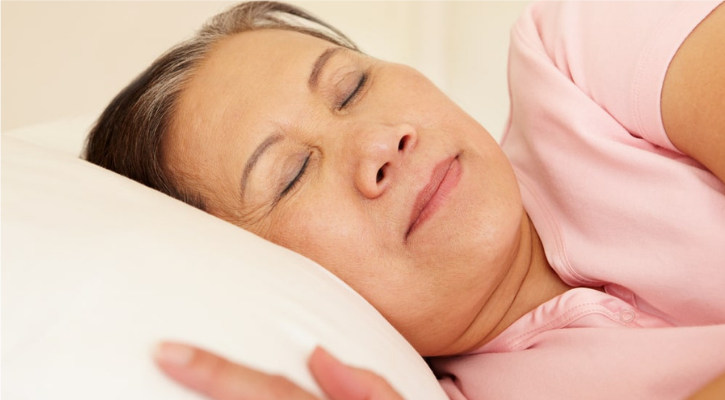Cognitive Behavioral Therapy (CBT) may provide a nonmedication treatment option for women who are experiencing sleep disturbances as a result of menopause, concludes a new study.
“Compared to premenopausal women, women who are going through menopause transition complain of more sleep disruption,” Dr. JoAnn Pinkerton, professor of obstetrics and gynecology at the University of Virginia Health System and executive director of the North American Menopause Society (NAMS), which publishes the journal in which this study appeared, told Mattress Clarity via email. “… We need nonhormone and nonmedication options for women with bothersome hot flashes, night sweats and sleep disturbances and small trials have suggested CBT may be helpful.”
Those small trials inspired the latest study, which is the first study of its kind to examine the impact of CBT — a form of psychotherapy that addresses issues via the modification of thoughts and behaviors — on a wide range of physical and psychological menopause symptoms (as opposed to exclusively studying the impact on hot flashes). The study was published in the journal Menopause.
Menopausal Symptoms and Cognitive Behavioral Therapy
According to Pinkerton, there are several reasons why women who are going through menopause may experience sleep disturbances.
“This is partly related to hormonal changes, as taking hormone therapy decreases sleep disruption and improves rapid eye movement (REM, dream) sleep,” Pinkerton told us. “Women with nighttime hot flashes are more likely to complain of sleep disruption. However, other factors may come into play, such as need[ing] to urinate in the middle of the night, the onset of sleep disorders such as sleep apnea or restless legs, chronic pain or depression, worsening anxiety, [or] stress due to aging parents or teenagers.”
While many women turn to hormone replacement therapy in order to combat some of the symptoms of menopause, this may not be desirable or a viable option for all women. The new study suggests that Cognitive Behavioral Therapy may provide a nonmedication alternative for managing menopausal symptoms such as sleep disturbances.
In the study, “women with menopausal symptoms were randomized either to receive cognitive behavioral therapy (CBT-Meno) or a waitlist (no active intervention),” Pinkerton says. “The women were studied prior to treatment at 3 months, and then 3 months after completion of CBT meno.”
The 12 weeks of CBT therapy included education about menopausal issues and behavioral strategies that might improve sleep. Pinkerton told us those strategies included “stimulus control, sleep restriction, and cooling strategies and challenged unhelpful sleep-related beliefs.” The CBT therapy also offered cognitive and behavioral strategies for coping with hot flashes, mood, depression and anxiety, and sexual concerns.
The study results suggested that CBT proved an effective intervention.
“Compared to women on the waitlist, the CBT-meno 12-week sessions improved bothersomeness of hot flashes, mood, sleep, and sexual concerns,” Pinkerton told us. These improvements were sustained for at least three months after participants finished receiving CBT therapy.

Monkey Business Images/Shutterstock
Why CBT May Help with Sleep
Pinkerton says there are a couple of reasons why CBT may be useful for managing the sleep disturbances that are common during menopause.
For starters, the CBT therapy program offered education in stimulus control. Per Pinkerton, participants were taught to “reassociate the bed/bedroom with sleep and to re-establish a consistent sleep schedule.” This included strategies such as going to bed only when tired, leaving the bed if unable to sleep, using the bedroom only for sleep and sex, waking up at the same time every morning, and avoiding naps.
This kind of stimulus control has been shown to reduce the anxiety that people may feel as they head to bed, thereby assisting in the management of insomnia.
Additionally, Pinkerton points to the fact that the CBT program also encouraged sleep restriction. “[This] limits the amount of time women allow themselves to sleep in the bed to increase the desire to sleep (called sleep drive),” she says. This practice may result in less fitful sleeping and improved sleep efficiency.
Thus, Pinkerton says that women who are going through menopause may find that “developing healthy habits at bedtime and sleep hygiene with [a] repetitive sleep routine can help improve sleep.”
Pinkerton offers several examples of healthy sleep habits:
- “Have a regular sleep schedule for going to sleep and getting up.
- Avoid daytime napping or limit it to one sleep cycle of 20 minutes.
- Develop a regular bedtime routine and use it when it’s time go to sleep at night; if a person wakes up in the middle of the night, such as going to the bathroom, drinking a small amount of a warm sleepy-time tea, reading a book with the light on the book, listening to music or white noise, or taking a relaxing warm bath before… bedtime…
- The light from watching television or using computers, iPads, or mobile phones in the bedroom may make it more difficult to fall asleep, so use the bedroom for sleeping.
- Menopausal women tend to sleep better in slightly colder rooms, such as 68 degrees.
- Exercise regularly but not near bedtime.
- Alcohol may make people drowsy but is associated with sleep disruption and less quality sleep.
- Avoid eating large meals near bedtime.
- Avoid caffeine after about 2 pm.”
While this was a small study, the results were significant and may lead to further research that can help the millions of women going through menopause develop nonmedication strategies for enjoying better sleep.
Featured image: STUDIO GRAND WEB/Shutterstock


